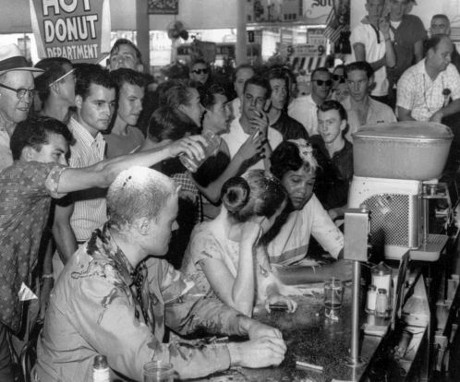What Ever Happened to All the Old Racist Whites from those Civil Rights Photos? by Johnny Silvercloud raises an interesting question but never considers it from a modern technology perspective.
Silvercloud includes this lunch counter image:
I count almost twenty (20) full or partial faces in this one image. Thousands if not hundreds of thousands of other images from the civil rights era capture similar scenes.
Then it occurred to me, unlike prior generations with volumes of photographs, populated by anonymous bystanders/perpetrators to/of infamous acts, we have the present capacity to deanonimize the past.
As a starting point, may I suggest Deep Face Recognition by Omkar M. Parkhi, Andrea Vedaldi, Andrew Zisserman, one of the more popular papers in this area, with 429 citations as of today (06 July 2017).
Abstract:
The goal of this paper is face recognition – from either a single photograph or from a set of faces tracked in a video. Recent progress in this area has been due to two factors: (i) end to end learning for the task using a convolutional neural network (CNN), and (ii) the availability of very large scale training datasets.
We make two contributions: first, we show how a very large scale dataset (2.6M images, over 2.6K people) can be assembled by a combination of automation and human in the loop, and discuss the trade off between data purity and time; second, we traverse through the complexities of deep network training and face recognition to present methods and procedures to achieve comparable state of the art results on the standard LFW and YTF face benchmarks.
That article was written in 2015 so consulting a 2017 summary update posted to Quora is advised for current details.
Banks, governments and others are using facial recognition for their own purposes, let’s also uses it to hold people responsible for their moral choices.
Moral choices at lunch counters, police riots, soldiers and camp guards from any number of countries and time periods, etc.
Yes?
